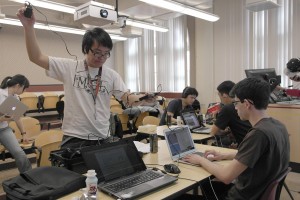USC hosts HackSC

Hackers’ delight · Students from a variety of different schools in California, such as USC and Stanford, attended HackSC which took place from March 7-9. The coders hacked for 36 hours straight. – Christine Yoo | Daily Trojan
From Friday night and going until Sunday afternoon, programmers from all over the state arrived at USC for HackSC, a 36-hour hackathon.
A hackathon is a conference in which programmers gather, arrange themselves in teams, and then spend the next few days in a programming marathon trying to create the best final project in so short a time.
HackSC began the way many hackathons do: with a commencement speech made by a fellow hackathon goer. USC brought in the COO of Oculus Virtual Reality, Laird Malamed, to speak to the programmers.
Malamed discussed his love for computer science and programming, inspiring students by telling stories of successful programmers who started their careers through their hackathon projects.
Idean Keshmirian, a freshman majoring in computer science, commented on the commencement address.
“It’s basically a pep talk, trying to get us pumped up, you know?” Keshmirian said. “It actually works. You walk away feeling like the things you do here could really lead to something.”
David Bell, a freshman majoring in computer science, noted the degree of commitment the programmers go through.
“Most of [the programmers] probably haven’t slept all night so you may be questioning a bunch of coding monsters,” he said.
Bell seemed to have the right idea.
“Hell no, I’m not sleeping! Sleep is for the rich and I ain’t rich yet,” said Okky Jy, a sophomore from Santa Monica Community College.
Saturday was a day dedicated to coding, and each team found a classroom where they set up camp.
Brian Kim served as the head organizer of the Hackathon and of HackSC and noted the intense preparation involved.
“There is so much that goes into planning an event like this,” Kim said. “We had to talk to the administration, make sure we had caterers and vendors, reach out to other communities, among other things.”
His aim for the event was to expand programming opportunities to those who normally wouldn’t have the chance.
“Our goal with HackSC was to give the students a lot of support as they worked,” Kim said. “We tried to find students that were interested in programming but didn’t really know how to do it outside of a classroom. We’ve set up a mentoring program so it’s less intimidating and more enjoyable.” We wanted HackSC to be a learning experience for young programmers.”
Keshmirian also commented on the welcoming nature of USC’s hackathon.
“I’ve been to other hackathons where no one wants a beginner on their team,” Keshmirian said. “It’s a warmer environment here. I feel happy being here. I haven’t been excluded at all, and I don’t feel like a nerd here.”
Each team decided on one project to collaborate on and then worked tirelessly towards a final product. One group in particular was working on a project named Textres, a search engine which works through SMS text messaging.
“This idea would be especially relevant to developing countries that have cellular capabilities but don’t have smart phones,” Kim said. “These people could text ‘Where’s the nearest hospital?’ and receive a text response.”
Sunday morning, those who attended HackSC gathered to demo their projects. Later in the day, the winners of the competition were announced. A team from California Polytechnic State University, Pomona, won first place with an immersive Oculus Rift Flappy Bird clone with crowd interaction. A USC team followed in second place.
“This really isn’t about the competition, though,” Kim said. “We just wanted to provide up and coming programmers with an opportunity to create.”
Editor’s note: This post has been updated.


USC team was second place. Good article though.
The team was from California Polytechnic State University, Pomona.